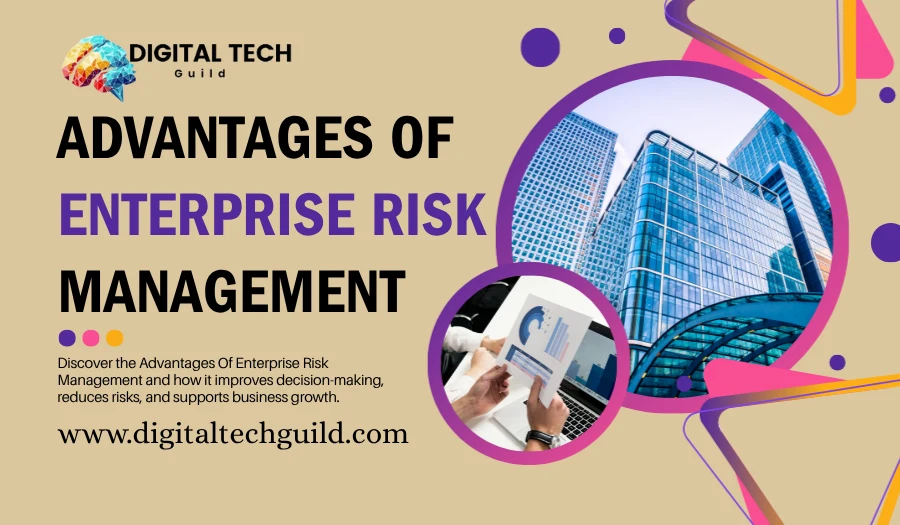When I consider the importance to Advantages Of Enterprise Risk Management, I realize that it's much more than an euphemism. It's a crucial aspect of running a profitable business in the present. If you're a small-scale business owner or a member of a larger corporation knowing how to effectively manage risk can make all the an impact on the growth of your company and stability.
What precisely does Enterprise Risk Management (ERM), and why should we be concerned about it? In this blog post, I'll explain the benefits that enterprise risk management offers as well as discuss how it works and explain why every company requires a risk management program in place. Let's take a look!
What Is Enterprise Risk Management?
Simply put, Enterprise Risk Management (ERM) is the process of identifying, evaluating and managing the risks that a company is exposed to. These risks vary from financial uncertainty to cyber-related threats, or operational interruptions.
As a business grows its exposure to different types of risk increases. That's the reason ERM can help businesses to anticipate risks and devise strategies to minimize or eliminate these risks. ERM is a comprehensive approach to managing risk at the organizational level that integrates all aspects of business into one unifying strategy.
Read also: Future Trends In Enterprise Technology
Why Is Enterprise Risk Management Important?
You might ask, "Why is enterprise risk management important?" The answer is easy. There are risks everywhere, and if you don't have the right strategy put in place, businesses may be liable for catastrophic results. ERM can reduce the negative impact of unplanned events, offering companies a greater chance to thrive in uncertain conditions.
One of the main benefits in enterprise risk management can be that it is able to provide a structure for dealing with uncertainties. It doesn't matter if it's a shift in the market or a new law, companies with an ERM system have the tools to face these issues. Benefits include better decision-making, improved efficiency and less vulnerability.
Top 10 Advantages Of Enterprise Risk Management
This is where things get exciting! Let's glance at top 10 benefits of risk management for enterprises in order to understand how they could be beneficial to your business:
1. Proactive Risk Identification
One of the major benefits for ERM can be its proactive method of managing risk. Instead of waiting for problems to develop, ERM allows companies to spot potential risks before they turn into issues. Through taking a look at everything from legal risks to financial compliance issues, businesses are able to react quickly to minimize these risks.
2. Improved Decision-Making
If a company is aware of the risks it's facing and the risks it faces, it is able to make better choices. ERM aids decision makers to understand the potential risks and allows them to assess the risks and benefits when considering potential opportunities. If you're thinking about investing or launching a brand new item, ERM gives you the knowledge you need to make a sound decision.
3. Enhanced Business Continuity
By identifying and addressing risks ahead of time, ERM helps businesses keep running even in disruptions. If it's a natural disaster or cyberattack, as well as a financial recession, an efficient corporate risk management process will ensure that companies are better equipped to quickly recover and keep running seamlessly.
4. Compliance and Regulatory Benefits
The significance of ERM in ensuring compliance can't be overemphasized. Implementing a well-designed ERM strategy can help companies remain in compliance with industry regulations and standards, thus avoiding penalties and fines. ERM allows organizations to create solid compliance frameworks to ensure they follow the necessary standards and regulations.
5. Cost Savings
It is possible to think that the implementation of ERM is expensive, but it's not. ERM system is expensive however, in actual fact it could save you cash in the long term. By avoiding the risk of costly losses including operational issues, legal concerns or data breaches firms can steer clear of major financial losses. In reality, ERM can often be economical relative to the expense of dealing with the consequences of uncontrolled risks.
Read also: Net Core Enterprise Application Services
6. Better Risk Mitigation
A ERM program lets businesses assess and limit risk in every aspect of their business. From cybersecurity to disruptions in supply chain, ERM helps ensure that every risk is accounted for and managed effectively. This helps reduce the risk of substantial loss in the event of an incident.
7. Risk Reduction for Financial Stability
The primary objective the purpose of ERM's primary goal is to minimize the financial risk--whether by implementing better investment strategies, better cost management, or protecting from fraud. ERM aids in stabilizing cash flow and helps maintain financial health and ensures that the company is able to weather the storms.
8. Faster Response to Threats
Tools for managing risk in companies including surveillance systems as well as live analysis of data enable businesses to react quickly to threats. Advantages Of Enterprise Risk Management with the proper ERM system, companies are able to spot risks in real time and immediately take actions to minimize their impact, which will result in an immediate and efficient response.
9. Better Reputation and Trust
Customers as well as investors will more readily believe companies that are actively managing its risk. A strong ERM program can build credibility by reassuring the public that your business is prepared for any eventuality. As time passes, this leads to better relationships with customers and an improved reputation in the marketplace.
10. Continuous Improvement and Adaptability
The world is changing constantly and companiesmust remain alert. ERM allows businesses to constantly adjust to the new demands by continuously assessing the risks. This flexibility helps businesses remain efficient and resilient within an ever-changing environment.
Read also: Benefits Of Enterprise Data Analytics
What Are Examples of Successful ERM Programs?
To illustrate the efficacy to illustrate the effectiveness of Enterprise risk management We'll take a look at some examples of effective ERM programmes:
-
financial Institutions: For banks, ERM can play a important role in identifying risk that are related to market volatility in addition to credit risk, as well as liquidity. Effective programs have helped banks keep their businesses afloat during financial crises by providing warnings early and solutions to financial risk.
-
Technology Companies: Technology companies that handle privacy concerns with regards to data depend extensively on ERM to deal with cybersecurity risks. A well-designed cloud-based risk management system guarantees that customer information is secured and is in compliance to global laws.
-
Health Sector Healthcare professionals utilize ERM to deal with concerns like patient safety and the compliance of health laws and even disruptions to operations caused by outbreaks. These programs ensure that healthcare services function smoothly in times of emergency.
Conclusion: Advantages Of Enterprise Risk Management
In the end the benefits from Enterprise risk management are evident. From improving decision-making, to reducing financial risk, ERM is vital to the long-term viability of any business. With a complete system for managing risk in the enterprise program companies can not only safeguard themselves from a variety of threats, but also open up new avenues to grow and achieve success.
Be aware that managing risk in the enterprise is not a once-and-for-all job. It's an ongoing process that requires continuous attention and constant adaptation. With the appropriate tools and strategies, companies can establish a solid base in the near future knowing that they're prepared to meet any challenge that comes their path.
I hope that this guide made you aware of the significance of risk management in the enterprise in making a huge impact on your company. If you have any concerns or would like to dig deeper into a specific area you can post a comment below!
FAQ's: Advantages Of Enterprise Risk Management
1. What do I make ERM help reduce the risk of financial losses?
ERM assists in identifying the financial risks such as fraud, market volatility and bad investment choices. By monitoring the risks carefully businesses can take preventative steps in order to avoid large financial loss.
2. Is Enterprise Risk Management cost-effective?
Although ERM systems might require an initial investment but they're generally economical over the long run. By eliminating costly disruptions and minimizing risks, businesses are able to save money and decrease the risk of financial loss.
3. What role does AI in the enterprise risk management?
AI plays an important part in ERM, by automating risk detection, looking for trends in the data and providing instant information. AI-powered tools can detect the hidden risks and suggest strategies to minimize them, which makes ERM more effective and efficient.
4. What are the various types of risk for enterprises?
Risks for enterprises can be classified into a variety of categories, including the financial risk, operational risks, cybersecurity risks as well as the risk to compliance. Each one requires a specific method of managing risk to ensure that it is properly managed.











